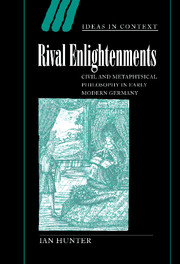Book contents
- Frontmatter
- Contents
- Preface
- Acknowledgements
- List of abbreviations and texts used
- Note on conventions
- Introduction
- PART I RIVAL ENLIGHTENMENTS
- PART II CIVIL AND METAPHYSICAL PHILOSOPHY
- 3 Leibniz's political metaphysics
- 4 Pufendorf's civil philosophy
- 5 Thomasius and the desacralisation of politics
- 6 Kant and the preservation of metaphysics
- Postscript: The kingdom of truth and the civil kingdom
- List of references
- Index
- IDEAS IN CONTEXT
3 - Leibniz's political metaphysics
Published online by Cambridge University Press: 22 September 2009
- Frontmatter
- Contents
- Preface
- Acknowledgements
- List of abbreviations and texts used
- Note on conventions
- Introduction
- PART I RIVAL ENLIGHTENMENTS
- PART II CIVIL AND METAPHYSICAL PHILOSOPHY
- 3 Leibniz's political metaphysics
- 4 Pufendorf's civil philosophy
- 5 Thomasius and the desacralisation of politics
- 6 Kant and the preservation of metaphysics
- Postscript: The kingdom of truth and the civil kingdom
- List of references
- Index
- IDEAS IN CONTEXT
Summary
INTRODUCTION
If the conflict between civil and metaphysical philosophy represented a major fissure in the academic–intellectual culture of early modern Germany, then one of its central texts is Leibniz's celebrated Opinion on the Principles of Pufendorf. Written in 1706 at the request of the abbot of Locum (Molanus), this text was first published as an appendix to Jean Barbeyrac's French edition of Pufendorf's De Officio (1718). Here it was interspersed with Barbeyrac's adjudicatory comments, intended to mediate the conflict for the Huguenot Diaspora (Barbeyrac 1718). In his monitory discussion of the De Officio, Leibniz comments that while he agrees with Pufendorf's derivation of duties from laws, Pufendorf has no idea of the depth of natural laws or the scope of the duties they embrace. Leibniz expands this comment with the following remarks:
But my analysis of this is scarcely recognised by our author, [namely] that in a universal society governed by God every virtue… is comprehended among the obligations of universal justice; and not only external acts, but also all of our sentiments are regulated by a certain rule of law; thus those who are worthy of being philosophers of law [must] consider not only concord among men [humanae tranquilitatis], but also friendship with God, the possession of which assures us of an enduring felicity. (PW, 73)
These remarks provide a useful pointer to the central differences between the natural law doctrines of Pufendorf and Leibniz.
- Type
- Chapter
- Information
- Rival EnlightenmentsCivil and Metaphysical Philosophy in Early Modern Germany, pp. 95 - 147Publisher: Cambridge University PressPrint publication year: 2001
- 1
- Cited by

